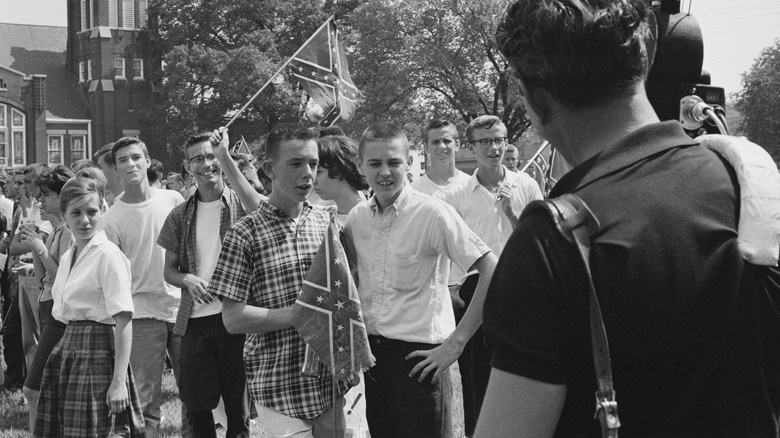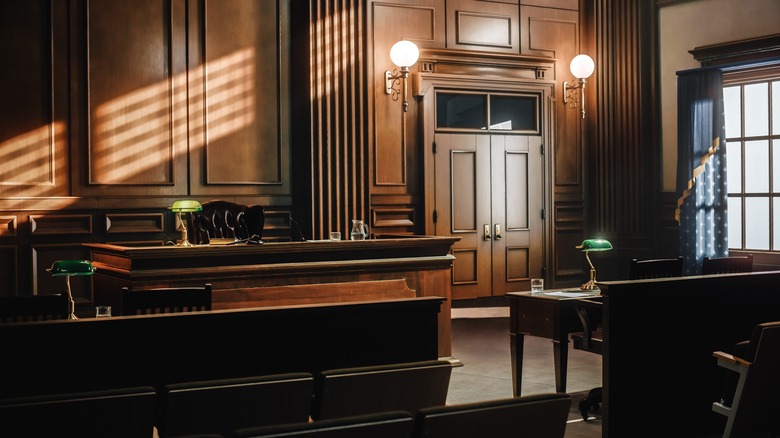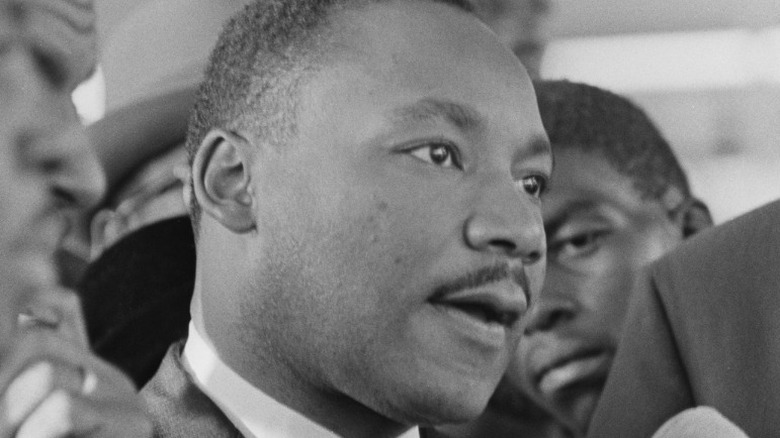The Tragic 1963 Murder Of 13-Year-Old Virgil Lamar Ware
In the wake of all of the racial turmoil the United States was facing during the 1960s, one tragedy that will forever be etched in the history books was the murder of four young Black American girls in a Birmingham, Alabama church. According to the FBI, a bomb made from dynamite exploded in an interior stairwell of the 16th Street Baptist Church, killing the girls as they attended services. In all, 20 other innocent people were injured in an attack that was determined to be racially motivated. Though there was not enough physical evidence to link them, four local members of the Ku Klux Klan were suspected of the attack. However, witnesses who could have put the men in prison would not come forward for years.
Eventually, some justice did prevail. Three of the four suspects were incarcerated, with the government trying and convicting Klansman Roger Chambliss in 1977 and given a life sentence. In 2000, the FBI reopened the case and successfully prosecuted Chambliss' cohorts Bobby Frank Cherry and Thomas E. Blanton, Jr. Like Chambliss, they were each sentenced to life terms. The fourth terrorist, Herman Frank Cash, died in 1994 before charges could be filed.
Though the nation mourned the tragic loss of innocent lives, two other children died that day as a result of the bigotry that permeated in Birmingham. Sixteen-year-old Johnny Robinson was killed by the blast of a deputy's shotgun (per NPR). Also, Virgil Lamar Ware, who was just 13 years old also became a casualty of racism as he rode on the handlebars of his older brother's bicycle.
Virgil and his brother were beginning their paper route when they were attacked
Virgil and his brother, James, set out on that afternoon from their home in a Birmingham suburb on their way to deliver newspapers for a route that they recently received. While peddling down a road just outside of Birmingham, the two brothers did not know that the church bombing took place just several hours before. The two brothers, who lived in Pratt City, rarely had interactions with white people (per Time Magazine). Their next interaction would prove to be deadly.
Also on the road that afternoon were two white teenagers, Michael Lee Farley and Larry Joe Sims, who were riding on Farley's motorbike. The two young men, both of whom were 16 years old, just came from a segregationist rally held in Birmingham that afternoon. Sims was carrying a pistol that belonged to Farley as the two sped down the road. Though he admitted to attending the rally, Sims didn't consider himself to be at the forefront of the racial bigotry that was the zeitgeist in the south. In fact, Sims' family sympathized with the certain de-segregation efforts led by civil rights leaders (per Time Magazine). It was noted that his father was a critic of Birmingham Police Commissioner Eugene Connor, who used brutal tactics to break up civil rights demonstrations.
Despite his family's quiet positions and his personal indifferences to these issues, Sims found himself with friends at the rally that day. Speeding away from it toward home, the Eagle Scout was about to make a decision that took one innocent life and forever changed his own.
Virgil was shot twice by his assailant's pistol
The motorbike carrying Farley and Sims encountered Virgil and James Ware. Black Then tells us that, thinking the Ware brothers might have been a part of Black protestors that were throwing rocks at white people, Farley instructed Sims to shoot at the youths but not to kill them, the two teenagers would later claim to investigators, but to scare them.
Sims drew his friend's weapon and fired at the approaching bicycle. Two bullets struck the younger Ware brother; one in the chest and one in the cheek. Time Magazine reports that the impact of the bullets sent Virgil careening off of his brother's bicycle and into a nearby ditch. Reportedly, as Farley and Sims sped away, Virgil told James that he had been hit by the gunfire. James dismounted the bike and ran to Virgil's side. Virgil died in his brother's arms before any help arrived (per Alabama Local News).
With Virgil dead and two suspects on the loose, the story of the injustices that erupted that day in Birmingham were only just beginning. Police would soon learn from James that they should be looking for two white teens on a red motorbike. Though it wouldn't take long to apprehend Farley and Sims, many felt that it wasn't a full dose of justice that was about to be served.
The police were able to quickly locate Sims and Farley
Time Magazine reports that Farley and Sims raced to a friend's house after the shooting. They begged their friend to let them hide Farley's pearl-handled revolver under his mattress. Police were able to locate Farley based on tips given to Jefferson County Sheriff's Detective Dan Jordan and his partner, Detective J.A. Alpine. Alabama Local News tells us that a Mountain Brook police officer told investigators that he saw a red motorbike on the road the day of Virgil Ware's murder, with one of the riders having the noticeable bulge of a pistol coming out of one of his jacket pockets. The officer made note of the motorbike's tag and turned it over to Jordan and Alpine.
The detectives found Farley at his home and questioned him about Virgil's murder. He steadfastly denied any involvement. But when the detectives questioned Sims at his home, Time Magazine reports that the teen confessed to the murder in front of his parents. Claiming he didn't intend to actually hit Virgil and only scare him, his admission made Farley "fume," according to the news outlet. Now that there was a confession to the police, charges could be levied against both Sims and Farley. With a strong case presented by police to prosecutors, Sims and Farley would find themselves at trial facing charges of first-degree murder.
You could get more time back then for killing a good hunting dog
Though charged with an offense that could have resulted in the death penalty in Alabama, the court cases of Farley and Sims served as yet another example of leniency of white offenders receiving light sentences for serious crimes against Black Americans. The pair were tried in court on first-degree murder charges but were not convicted of them. Time Magazine points out that the all-white jury refused to convict the teens on the most serious charge, opting instead to find them both guilty of second-degree manslaughter.
Sims and Farley were given a very light sentence of seven months confinement (via Black Then). Even if the murder was accidental as Sims claimed, it could be argued that the recklessness and racist motivation behind their actions would surely have warranted a harsher punishment. Adding insult to the pain that Virgil Ware's family was already enduring was the subsequent actions the judge in the case took after their conviction. Judge Wallace Gibson chose to suspend both Sims and Farley's sentences and give them two years of probation. At this announcement in the courtroom, Time Magazine reports that Virgil's mother Lorene Ware fell apart in tears and cries of anguish.
James Ware said of the actions taken by Judge Gibson "You could get more time back then for killing a good hunting dog."
Sims and Farley didn't apologize until years later
Sims and Farley completed their probations and were released from court supervision in 1965 (via Alabama Local News). Of their sentences, Detective Jordan remarked in a recent interview that the teens had "gotten off light." In the years that followed, Sims felt remorse for his actions that day in 1963. After college, he volunteered to serve in Vietnam, noting that the military was disproportionately sending poor people of color to fight. Time Magazine tells us that he became more conscientious of the Civil Rights Movement and that potentially serving as a "grunt" in a land war was a way to purge at least some of his guilt.
In 1997, both Sims and Farley phoned the surviving members of the Ware family to apologize for their actions that took the life of 13-year-old Virgil Ware, who was just out with his brother, James, trying to earn money. While some members of the Ware family accepted the men's apologies, not all of the family was ready to accept the apologies. Virgil's sister, Joyce, said of forgiving Sims and Farley, "Lord knows I haven't. He was my brother."
With the life of an innocent kid taken so tragically and recklessly by racist motivation, it's hard for some people to fault her for withholding her forgiveness. The deaths of Virgil Ware, Johnny Robinson, and the four young girls killed by the bomb blast, marked a dark day in America's history but served as a rallying point for many civil rights leaders and activists to continue to push for social changes in the southern United States and beyond.





